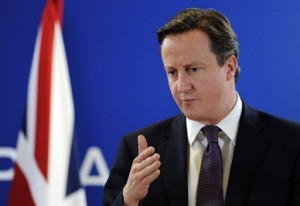“Moderation in all things”, said a pre-Christian North African Roman dramatist, Terence [Publius Terentius Afer].
But like so many artists, he latched on to a beautiful artifact but got the logic wrong. He’s echoed these days in the oft repeated mantra from talking heads calling for compromise. It usually follows a description — inaccurate, of course — of how we are passing through the greatest crisis ever. But just a little recall of past troubled times demonstrates how equally or more difficult earlier threats were — whether bloody days of World War II or the U.S. Civil War.

Logically, we cannot have it both ways: to describe our present situation as a full blown crisis demands we recognize solutions will have to be drastic, not measly compromises. Whether we are looking at current U.S. political contests or the European economic scene, this need for incisive answers must match the depth of the crisis. And for the most part the price to be paid for that has not yet received general acceptance.
On the one hand, a dilemma is posed for American voters going toward the November 2012 elections faced with Republican primary choices: are they to believe Gov. Mitt Romney, graduate of both government and business but whose whole career has been compromises in the face of problems, is the man to help rescue the U.S. from its worst business cycle since the Great Depression? Or are they to go for an adventurous, perhaps untested, advocate of a major overhaul of an impasse — for the moment, at least, incapable of the kind of correction which followed one recession after another since World War II?
Somewhere, too, in all this theater is the question of “confidence”. In a digital age of unlimited data, it is easy to forget the economy runs on a psychological track often more important than so-called hard statistics no matter how many we now can quickly churn out. And the kind of inspiration needed to restore “confidence” often may have little to do with successful economic remedies. For those who did not live through it, it’s important to recall Franklin Delano Roosevelt’s New Deal was the quintessential embodiment of this phenomenon. In the end, FDR had no economic solutions for the Great Depression.
President Barack Obama’s pronouncements and other amateur historians notwithstanding, the U.S. economy did not recover its former prosperity until mobilization for World War II revolutionized the whole economic landscape. But Roosevelt’s Fireside Chat leadership did inspire hope when morale of the American people was at its lowest ebb.
The parallel crisis now dogging Europe is, too, as much psycho-political as economic. The Europeans, to block a possible third round after two wars almost costing Western civilization, began political and economic unification. But the European Project has been built top-down, guided by extremely clever bureaucrats creating a supranational framework. In the process, basic and conflicting interests of Europe’s different vibrant cultures — the glory of the continent — were not adequately considered, much less integrated in a bottom-up process.
The Euro, a common currency theoretically fitting all, was an attempt at this kind of forced amalgamation – and its demise was predictable for that very reason.
Now the patchwork to salvage it — for it has become a totem of the whole effort at European unification — continues but with little likelihood any solution can be more than temporarily successful. It was emblematic British Prime Minister David Cameron should play the villain in the latest act by refusing a new treaty pledging renewed conformity to guiding safeguards. The proposed new pact is not all that different from earlier formal statements which even France and Germany, now presenting themselves as paragons of economic virtue, violated.
Having lost so much of its former glory, London’s role as the world’s second financial center was at stake. For any British leader not to have protected that would have been the last straw in reducing further Britain’s diminished world as well as its European role. How to accommodate London’s primary interest in the European Union’s economic community should have been a problem negotiated long ago.
But, now, for the moment, Frankfurt and Paris have their revenge for their long apprenticeship to The City. In the long run, however, it can only be seen as another failure of a semi-authoritarian European movement.
Sol W. Sanders, (solsanders@cox.net), writes the ‘Follow the Money’ column for The Washington Times on the convergence of international politics, business and economics. He is also a contributing editor for WorldTribune.com and East-Asia-Intel.com.

